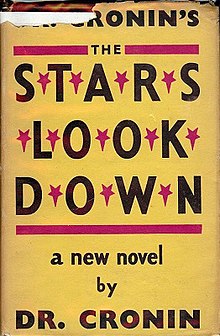The Stars Look Down

First UK edition
|
|
| Author | A. J. Cronin |
|---|---|
| Country | United Kingdom |
| Language | English |
| Publisher |
Gollancz (UK) Little, Brown (US) |
|
Publication date
|
1935 |
| Media type | Print (hardback & paperback) |
| Pages | 701 p. (UK hardback edition) |
The Stars Look Down is a 1935 novel by A. J. Cronin which chronicles various injustices in an English coal mining community. A film version was produced in 1939, and television adaptations include both Italian (1971) and British (1975) versions.
The novel is set in 'Sleescale,' a mining town on the coast of Northumberland, as well as in 'Tynecastle' (Newcastle upon Tyne). While 'Sleescale' is a fictional locale, it is based on an excellent knowledge of similar places and people. Cronin, a Scot, served as Medical Inspector of Mines in the South Wales Valleys during the 1920s.
Beginning before World War I and extending into the 1930s, the story shows the different careers of several persons: principally, a miner's son who aspires to defend his people politically, a miner who becomes a businessman, and the mine owner's son in conflict with his domineering father.
The novel centres on three very different men:
Reactions to the failure of industrial action on safety issues in the coal mines are crystallised in the characters of Davey and Joe, who take vastly different routes in escaping from the working class. While Davey becomes an MP to fight for nationalisation of the mines, Joe essentially joins the mine owners.
Jenny Sunley is Davey's indifferent wife who craves social status, and other characters have short but distinct tales of their own. Cronin shows a broad sympathy for the workers and a dislike of the bosses, but also allows that at least some of the bosses can be decent at a personal level.
Central to the story is the Neptune coal mine and a catastrophe that occurs there. The Great War is also a factor: do you volunteer to fight, volunteer for non-military duties, use trickery to evade service or openly defy the system by refusing call-up? There is a brief description of one of the tribunals that examined conscientious objectors, often refusing to accept their objection as valid. There is also a clear commitment to the idea of nationalising the mines, replacing the mass of small private owners that existed at the time.
...
Wikipedia
